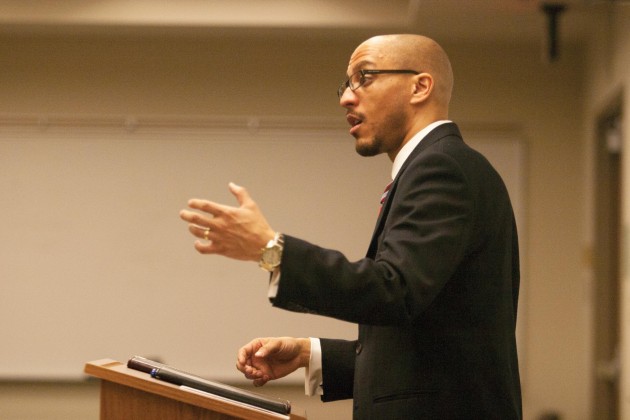
Martin Luther King, Jr. and Jackie Robinson made great strides for Civil Rights, but Ohio State University professor Hasan Jeffries says social movements take more than just a great individual.
"When you focus on an individual or an individual organization, you miss a lot more that's going on," Jeffries said.
The history professor visited DePauw Wednesday afternoon to deliver a lecture stemming from his doctoral dissertation on the intersection of the 1966 elections and start of the Black Power movement in Lowndes County, Alabama.
John Ditma, a former DePauw University history professor who introduced Jeffries, said the young professor is on the "cutting edge" of a "new wave of Civil Rights history."
But Jeffries said he doesn't think he has discovered anything new. "It's not about creating new history," he said. "It's about reemphasizing the history we do have and whose voice is heard."
Jeffries began his lecture, "Life is not a spectator sport: The fightfor freedom rights in the borough of Brooklyn to the Black Belt of Alabama," focusing on Jackie Robinson, the first African-American baseball player to break into the major leagues.
Jeffries said that Robinson's mantra, "life is not a spectator sport," guided and informed the lives of ordinary people in the Civil Rights movement.
"The grandstands of life and the American experience aren't filled solely with individuals with miraculous and sensational individual accomplishments," Jeffries said. "The grandstands of life in American history, when we think about the African-American experience, are filled with ordinary people."
Ordinary people like those in Lowndes County, Alabama defined the social movements of the Civil Rights era, Jeffries said.
Located just to the west of Montgomery, Alabama, "Bloody Lowndes" was a breeding ground for racial discrimination. Of the 5,122 African-American residents of the county eligible to vote in 1965, none were registered.
With the help of Stokely Carmichael and the Student Nonviolent Coordinating Committee, local African-Americans started the Lowndes County Freedom Organization and chose a snarling black panther as their Party symbol.
Four years later, the county elected its first African-Americansheriff and the black panther soon became a national symbol for the Black Power movement.
"The seed bed for Black Power was the fertile ground of the South," Jeffries said.
According to Jeffries, the impossible had happened in rural Alabama. A new movement and a new kind of politics, "freedom politics," emerged in Lowndes County in 1965.
These ordinary people, Jeffries said, understood that if they were not in the game of social change they weren't living up to the full meanings of their lives.
"‘Never doubt that a small group of thoughtful, committed people can change the world,'" said Jeffries, quoting anthropologist and DePauw University alumna Margaret Mead.
To Jeffries, the words of great men and women hold just as true for ordinary people.
"Jackie Robinson had it right," Jefferies said. "It is not simply enough to be a spectator in life. If you want change you have to do those things that people on the ground in Lowndes County, Alabama were doing."


